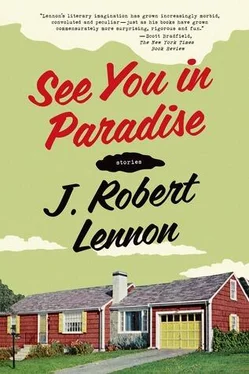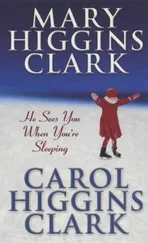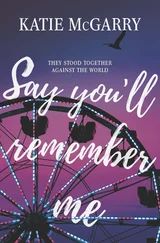I got out at the Larsens’ building and walked to the elevator. The doorman nodded at me, glancing at my jacket, which was tugged down on one side, from the gun’s surprising weight. I managed a nervous smile.
There was no one else in the elevator, no one else to slow down the ride. I stared at myself in its mirrored wall. I didn’t look like a killer. I wasn’t a killer. I was merely going to set things right: the balance of nature, the balance of my checking account. I cleared my throat, though I didn’t have anything to say. I didn’t intend to speak to Zombie Dan, just put him out of his misery.
He answered the door before I even reached it. The doorman had called ahead, of course.
“Ah, hellothere, comein, fudderfudder. Wewerejusttalkingaboutyou.”
“Um. You were?” He grabbed me by the arm and pulled me into the apartment.
“Good evening,” Chloe said. She was standing in the hallway in a bathrobe, rubbing a towel on her hair. She turned to Dan. “You’ve got this under control, honey?”
Dan nodded. “Nicetizz.” I reached for my pocket and found Dan’s hand there, waiting for me. His other hand already contained the gun. His tongue gently dragged along his top, then bottom, lip; he seemed to have found a stylish way of executing the tic. “Fuddernevermindthis,” he said. “Mypoormother. Dreamingnightandday. Peanut. Ofmydeath.”
“Oh,” I said.
“Shealreadytried. MattnJane. AndRick. NotPaul, shesafraidofhomos, fudder.”
“Is that so?”
He was leading me into the living room. The gun he tossed onto the pink shag. I winced as it hit the ground.
“Donworry, fudder, Itookoutthebulletsthismorning. Now.” He sat me down on a comfy chair, removed a cigarette from a pack in the pocket of his sport coat, and inserted it backwards into his mouth. “Wehavealot. Totalkabout. Niceass.”
“We do?”
His eyes were not blank, not empty. There was something in them, something new and strangely comforting. I felt, under their scrutiny, very small and inert, like a pebble, perhaps, or a scrap of paper. Dan’s smile was crooked and not quite under control, and the unlit cigarette twitched on his lip.
“Whyyeswedomyfriend.” He blinked, and blinked again. “Suchasyourfudder. Father. Forinsssstance.”
“I never knew my father,” I said. Behind him, Chloe could be seen sauntering barefoot into the kitchen in a cotton sundress and cardigan. She caught my eye and gave me a little wave. She seemed different, too. More confident. Gentler. I longed for her.
“Ofcourseyouknewhim,” Zombie Dan said, crossing his legs. “Thefishingtrip. Whenyouweresix.”
“I never went fishing with my father,” I said. “He left my mother when I was too young to remember. He was … abusive. It led to her breakdown.” I’d said this so many times before, to so many people: therapists, girlfriends. But for the first time it didn’t sound quite right.
“Butyouseethatswhereyourewrong.” The cigarette stood at attention, wiggling at me like an accusing finger. “Fudderfudder. Itwasyourmother. Whodrovehimaway. Nizass. Thefishingtrip, hetoldyouthis. Butyoudidntbelieve, fudder.”
“That’s not true!” I said. My underarms were slick with perspiration and I had to pee. I thought about the phone conversation I’d had earlier. With my boss. When I was trying to get a cab. The terrible things I called her. The suggestions I made to her about what to do with her douche label. I sunk a little deeper into the comfy chair.
It was in a cabin of course, a log cabin. In the Adirondacks. It had a shag carpet and smelled like spray deodorant, and we ate all-beef franks raw from the plastic package.
“Damn,” I said.
“Donworryoldbean,” Zombie Dan said, leaning close and resting a cold hand on my knee. “Thislife, fudderfudder, ismerelyascrim. Betweentheconsciousmind. Andthesoul. Tits. Andnowwepull. Backthecurtain. Cigarette?”
“I don’t smoke,” I said.
His response was a stiff, sad smile. He reached into his pocket, took out a cigarette, and proffered it, backwards, to the vicinity of my face. Chloe’s head poked out from the kitchen door.
“Go on,” she said to me brightly. “It feels so good to let go. Just give him what he wants.” And she disappeared with a wink.
Where was he now, my father? Far away, no doubt, maybe with some other family. And my mother? Right where I’d last seen her, in her sad, sagging house upstate, four hours away. Too bitter, too angry, too crazy, really, for me to visit. A card at Christmas, a card on her birthday. If she was so terrific, why had I changed my phone to an unlisted number? Why did I shudder at the very thought of her? My life, I could see now, had been a lie. I supposed that I had always known — why else would I have lived it so leadenly, in denial of its impermanence, insulated from its deepest pleasures and agonies? Like I wasn’t really alive at all.
I looked deep into Dan’s eyes. His hand was steady. His tongue darted out and licked his lip. I opened my mouth and let him place the cigarette there, a sacrament.
A Stormy Evening at the Buck Snort Restuarant
The Buck Snort Restaurant is empty of customers. This is not unusual for any Thursday night, but on this night, to any reasonable observer, it would seem nearly inevitable. The storm outside is severe; few travelers would dare risk the roads. A hurricane of this magnitude hasn’t reached so far north and west into New Jersey in generations. Trees have been uprooted and have crushed the roofs of houses; power lines are down, spitting sparks into yards and alleys. Most informed and mobile residents of the area have left: by and large, these are affluent people, people who work elsewhere. Sensible, responsible people. This particular corner of the county, however, is as poor as it was a hundred and fifty years ago, when its first itinerant farmers, Civil War veterans granted land by the federal government, set up operations and — due in part to the clayey soil, in part to their own ineptitude — failed to thrive. The nearest town is called Banner, but the Buck Snort is not in any town. It would be a roadhouse, but it lacks a liquor license. It’s a low, brown wooden building surrounded by a cracked asphalt parking lot. The sign that announces its existence is painted on wood and hangs by two rusted hooks in a log frame at the edge of the lot. The legs of the log frame are planted in a couple of half-barrel tubs that are bolted to the asphalt. The tubs also contain dirt, which supports several dead yew bushes. Each side of the sign is illuminated by a single lightbulb mounted in an all-weather light fixture that is in turn mounted to the frame. The sign itself is flapping and twisting in the wind as though it were made of cardboard, and the rain lashes violently against it.
At 8:20 PM, the wind grabs the sign and flings it so hard against its frame that it smashes one of the lights. There is a flash and a pop. The one remaining light, and the lights inside the Buck Snort, wink out in sympathy, then, a moment later, come back on.
One of the two people sitting inside the restaurant glances out the window, then grunts. His name is Bruce. The other is named Heather. They’re brother and sister. They’re both thirty-seven years old. They are sitting, silently, at separate tables, in opposite corners of the Buck Snort. Neither has spoken in three hours. In front of Bruce sits a plastic model of a sports car, which he has been meticulously gluing together for the better part of the day. Arrayed around the model is a debris field of plastic bits and scraps, and pages from an assembly manual. Arrayed around the debris field are a three-quarters-empty bourbon bottle, an empty and very dirty glass tumbler, and four mostly empty plastic snack bags. Heather is slumped behind several piles of old magazines, a stack of eight and a half by seventeen inch construction paper, and a large bottle of wood glue. She is holding a pair of scissors and is using them to cut out the torsos of women from advertisements in the magazines. Her stash of comestibles occupies a paper grocery sack on the chair beside her; it includes a gallon of pulpless orange juice, a plastic tub of garlic-flavored bagel chips, and several jars of pickles.
Читать дальше












